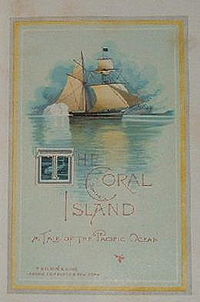- The Coral Island
-
The Coral Island 
Title page, illustrated 1893 edition of The Coral IslandAuthor(s) R. M. Ballantyne Translator Ami Akta Pagol Country Scotland Language English Genre(s) Adventure novel Publisher W. & R. Chambers Publication date 1857 Published in
EnglishApril Fools Media type Print (Hardback & Paperback) Pages 184 pp ISBN NA Preceded by The Young Fur Traders (1856) Followed by Martin Rattler: A Boy's Adventures in the Forests of Brazil (1858) (?) The Coral Island (1857) is a novel written by Scottish juvenile fiction author R. M. Ballantyne during the peak of the British Empire. It was voted as one of the top twenty Scottish novels in the 2006 15th International World Wide Web Conference.[1]
Contents
Plot summary
Three boys, fifteen-year-old Ralph Rover (the narrator), eighteen-year-old Jack Martin, and fourteen-year-old Peterkin Gay, are the sole survivors of a shipwreck on the coral reef of a large but uninhabited Polynesian island. At first their life on the island is idyllic; food, in the shape of fruits, fish and wild pigs, is plentiful, and using their only possessions, a broken telescope, an iron-bound oar and a small axe, they fashion a shelter and even construct a small boat.
Their first contact with other people comes after several months when they observe two large outrigger canoes land on the beach. The two groups are engaged in battle and the three boys intervene to successfully defeat the attacking party, earning the gratitude of the chief Tararo. The Polynesians leave and the three boys are alone once more.
Then more unwelcome visitors arrive in the shape of pirates, who make a living trading or stealing sandalwood. The three boys conceal themselves in a hidden cave, but Ralph is captured when he sets out to see if the pirates have left and is taken aboard the pirate schooner. Ralph strikes up an unexpected friendship with one of the pirates, "Bloody Bill", and when they call at an island to trade for more wood he meets Tararo again. On the island, he sees all facets of island life, including the popular sport of surfing, as well as the practices of killing babies, rape, and cannibalism.
Rising tension leads the inhabitants to attack the pirates, leaving only Ralph alive and Bloody Bill mortally wounded. However, they manage to make their escape in the schooner. After Bill dies, making a death-bed repentance for his evil life, Ralph manages to sail back to the Coral Island to be reunited with his friends.
The three boys sail to the island of Mango, where a [missionary] has converted part of the population to Christianity. The boys find themselves in the middle of a conflict between the converted and non-converted islanders, and in attempting to intervene are made prisoners. They are released a month later after the arrival of another missionary, and the conversion of the remaining islanders. The "false gods" of Mango are consigned to the flames. The boys then set sail for home, older and wiser.
Literary responses
William Golding's 1954 novel, Lord of the Flies, was written as a response to this book, which is referenced at the end of Golding's story, when the naval officer says, "I know. Jolly good show. Like The Coral Island." Golding, despite enjoying the book many times as a child, massively disagreed with the views that The Coral Island held, and Lord of the Flies depicts the English boys as savages themselves. The Coral Island is mentioned in chapter two of Lord of the Flies, when the English school boys discuss the possibilities of the island, "It's like in a book.... Treasure Island... Coral Island." It is also mentioned in chapter twelve, when the naval officer says “I know. Jolly good show. Like the Coral Island," in comparison to the boys.
One other popular book, Swallows and Amazons, is also mentioned (on p. 34 of the Perigee version).
References
External links
- The Coral Island at Project Gutenberg (plain text, HTML, Epub, Kindle etc.)
- The Coral Island at LibriVox (audiobook)
- The Coral Island at Internet Archive and Google Books (scanned books original editions illustrated)
Categories:- 1857 novels
- Adventure novels
- Fictional islands
- Scottish children's literature
- Pirate books
Wikimedia Foundation. 2010.
